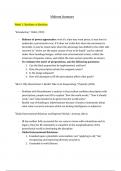Samenvatting
Midterm Exam Readings Summary
Readings covered: Introduction, Waltz (1959) Here's Why Mearsheimer's Realist Take is So Exasperating, Pepinksy (2022) Global International Relations and Regional Worlds, Acharya (2014) Theoretical Perspectives of Global Political Economy, O'Brien and Williams (2016) Social Forces, States, ...
[Meer zien]




